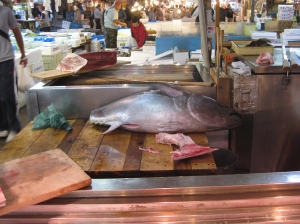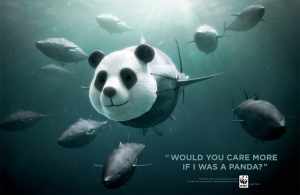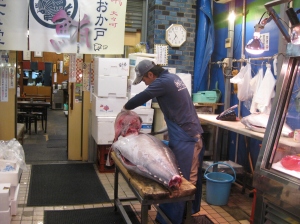As a vegetarian, I am obsessed interested in the conflict between eating something because it tastes good and knowing that animals suffer due to to cruel farming practices, species are harvested by environmentally devastating means, or a food species is endangered. I am also a marine scientist, however, and always up for seeing cool marine species. In 2012 I visited Tsukiji fish market in Tokyo, Japan. It was an amazing, fascinating experience and I was floored by
the number of bluefin tuna for sale. I was insanely excited (guiltily, so) to see a fish which I knew is endangered and which I knew was being sold for food in a way which was completely unsustainable. Why was I so excited? Well, bluefin is legendary, especially that which is sold at Tsukiji fish market where bluefin tuna are sold at auction for thousands, or even tens of thousands (!), of pounds. As I walked around the market, stepping around bluefin carcasses longer than I am tall, I kept thinking ‘Surely everyone knows blue fin is endangered, right?’. And as I encounter bluefin on menus across Japan, and, less frequently, in the UK or USA I always think ‘Everyone knows bluefin is endangered, right?’. If they are endangered, and everyone knows it, how can so many people, especially fisheries scientists, eat bluefin tuna?
When I returned to Japan in 2014 I asked some Japanese fisheries scientists why they still eat bluefin tuna when it’s well known the species is endangered, and they replied ‘It tastes good’. Today I found what I suspect is a second answer to that question. In a recent blog post by Bruce Buschel, he perfectly described what it’s like to visit the world’s largest fish market, the fate of Tsukiji, and how these things are entwined with the future of endangered bluefin. The post ends with this quote, which reminded me of my experiences at the fish market and my time asking awkward questions of Japanese fisheries scientists:
Back in the USA, I go out for a late-night snack with a chef friend to compare notes on Japan. The owner of a local bistro recognizes the chef and corners him. “Tell me something, chef. Why are customers giving me a hard time for serving bluefin tuna?” The chef gently lays out the statistics about the endangered creature. The owner listens, scratches his head, and then delivers a one-liner worthy of Yogi Berra: “If there’s such a shortage of tuna, how come I see it everywhere?”
Check out Buschel’s excellent blog about the fate of Tsukiji fish market and bluefin tuna: https://medium.com/gone/witnessing-the-last-days-of-blue-fin-tuna-at-the-tokyo-fish-market-4575ff0e7028
Abigail, Plankton and Policy





I’m also always curious about this, both in the fisheries and wider meat eating context. Particularly in the case of bluefin because clear science doesn’t seem to equate to clear moral obligation or even something more logical in terms of desire for more long-term sustainability for continued consumption. I always wonder – does it really taste that good (as the fisheries scientist said)? Does it really taste that much better than some of the more sustainable tuna options out there? I thought about this with Foie gras – which I’ve always thought I wouldn’t really eat because of ethical concerns, but I wanted to try it to see if it really was as amazing as people say (spoiler – It really wasn’t that good, and certainly not worth it compared to a really nice free range chicken liver pate of much higher ethical credentials). Difficult question as a vegetarian I guess, but do you think there’s call for trying to switch people to alternatives which may taste at least similar, but be more sustainable/ethical? This is my food blogger side coming out and something I’m thinking on focussing on!
LikeLike
I have no hesitation with interrogating the waiter or ordering off-menu when eating out. When it comes to something as important as fishing practices and sustainability I can’t believe people don’t ask more questions. Great idea to focus part of your blog on delicious sustainable alternatives for gourmet food!
LikeLike
Pingback: Science-policy collaboration is the key to sustainable management of Japanese marine ecosystems 海洋生態系の持続可能な管理に向けた科学と政策の協働 | Plankton and Policy
Pingback: Science-policy collaboration is the key to sustainable management of Japanese marine ecosystems 海洋生態系の持続可能な管理に向けた科学と政策の協働 | Plankton and Policy